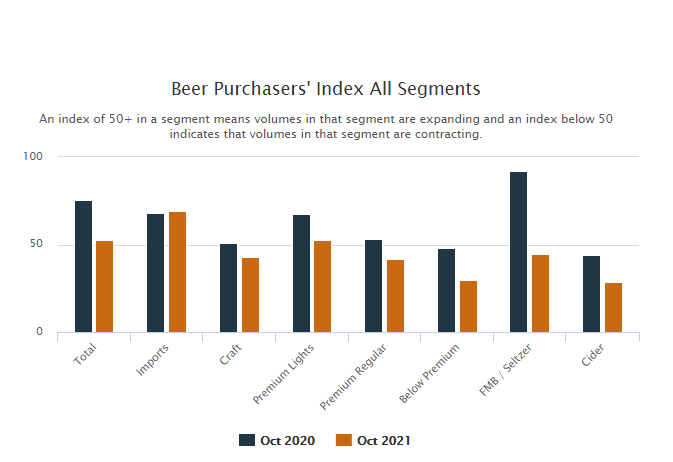Press Release
NBWA Releases October Beer Purchasers’ Index
Media contact: Erin Donar | EDonar@nbwa.org | 703-229-3702
ALEXANDRIA, Va. – Today, the National Beer Wholesalers Association (NBWA) released the Beer Purchasers’ Index (BPI) for October 2021. The October 2021 reading continues to reflect the recent trends that resemble the industry pre-pandemic, where a mid-50’s reading was typical for this time of year. However, the component segments of the index continue to show very different trends. Most importantly, the FMB/seltzer BPI reading took yet another dramatic hit, falling to an unprecedented 42 in October 2021 from 92 in October 2020. Imports and premium lights both reported expansionary (50+) readings this month.
The “at-risk” inventory measures for October across most segments remain below 50, signaling continued supply constraints in the industry. The exceptions are the FMB/seltzer (59) and craft (51) segments, which are experiencing expanding “at-risk” inventories heading into November.
About NBWA’s Beer Purchasers’ Index: BPI is the only forward-looking indicator for distributors to measure expected beer demand. The index surveys beer distributors’ purchases across different segments and compares them to previous years. A reading greater than 50 indicates the segment is expanding, while a reading below 50 indicates the segment is contracting.
Looking across the segments for October:
- The index for imports continued into expansion territory with a reading of 69 in October 2021, which is about the same as the reading in October 2020.
- The craft index posted a reading of 43 for October 2021, compared to a reading of 51 in October 2020. This is the second monthly reading below 50.
- The premium lights index posted a reading of 52 for October 2021, well below the October 2020 reading of 67. Premium lights continue to post index readings at or above the 50 mark in 2021.
- The regular domestic beer segment index posted a reading of 42 for October 2021, which is significantly below the October 2020 reading of 53.
- The below premium segment weighed in at 30, taking another significant hit from last October’s reading of 48.
- The FMB/seltzer segment continued to see significant declines this summer. This segment took another big hit, falling 48 points from 92 in October 2020 to 44 in October 2021.
- Finally, the
 segment remained below 50, with a reading of 29 in October 2021, compared to 44 in October 2020.
segment remained below 50, with a reading of 29 in October 2021, compared to 44 in October 2020.
The National Beer Wholesalers Association (NBWA) represents America’s 3,000 independent beer distributors who service every state, congressional district and media market across the country. Licensed at the federal and state levels, beer distributors get bottles, cans, cases and kegs from a brewer or importer to stores, restaurants and other licensed retail accounts through a transparent and accountable regulatory system. Distributors build brands of all sizes – from familiar domestic beers to new startup labels and imports from around the world – and generate enormous consumer choice while supporting more than 140,000 quality jobs in their home communities. Beer distributors work locally to keep communities safe by sponsoring programs to promote responsible consumption, combat drunk driving and reduce underage drinking.